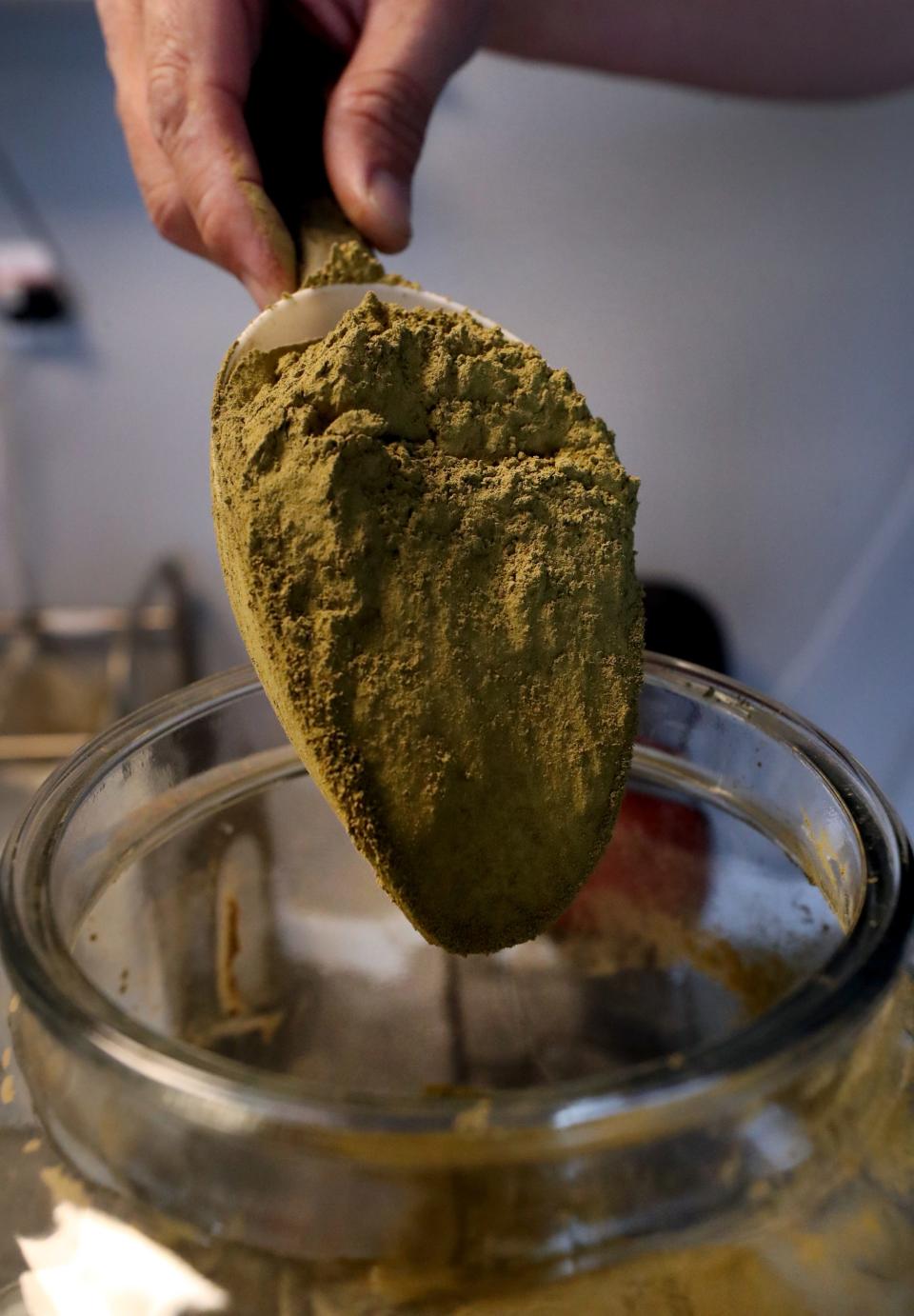This bill would legalize kratom in RI. What is it and why is it illegal now?
Rhode Island is one of only a handful of states where kratom, a controversial herbal substance, is illegal.
Two lawmakers, Rep. John "Jay" Edwards, D-Tiverton, and Rep. Brian Patrick Kennedy, D-Westerly, want to change that.
Their bill, H 5330, aims to legalize kratom and prevent adulterated products from being sold. Nicknamed the Kratom Consumer Protection Act, it mirrors similar bills introduced around the country at the behest of the American Kratom Association.
Currently, kratom is legal and largely unregulated on the federal level, though there have been attempts to ban it.
Legal pot in RI: RI dispensaries start to sell recreational pot: Everything you need to know

What is kratom?
Kratom is typically available in powder form and is made from the dried leaves of a tree that grows in southeast Asia. Its proponents insist that it should be described as a "nutraceutical" and not a drug.
It can be consumed in capsules and extracts, or brewed into a bitter-tasting tea. In Florida, you can buy kratom gummies at smoke shops and gas stations, or even order kratom delivery on UberEats, according to the Tampa Bay Times.
Kratom is sometimes marketed as an energy booster or a natural remedy for aches and pains. It's also considered by some to be a safe, less-addictive alternative to opioids. As a result, its popularity has grown in recent years, including among people who are trying to break their addictions to opiates.
Why is kratom controversial?
There's an ongoing debate over whether kratom is as safe as advocates say.
"There is currently no evidence of therapeutic effect from kratom in humans, but there is evidence of harm," Dr. Utpala Bandy, the interim director of the Rhode Island Department of Health, wrote in testimony opposing the bill. "These harms include seizures, agitation, liver toxicity, and death. Other adverse outcomes include dependence, withdrawal from cessation of use, and cases of neonatal abstinence syndrome."
According to the American Kratom Association, such claims are a product of the U.S. Food and Drug Administration's "long-standing bias" against dietary supplements, and based on faulty science.
The lobbying group says that no documented fatality "can be linked to use of the natural kratom plant alone." People who have died after taking kratom have typically also taken other drugs, or consumed adulterated kratom products that contained other dangerous substances, the organization says.
A fact sheet handed out by the AKA acknowledges that consumers "can develop a dependency on kratom," like with coffee, tea, and other caffeinated drinks. However, a dependency "is vastly different from an addiction," the association says.
More: Charged with bankruptcy fraud, Ernest Ricci shows disdain for the court, prosecutors say
Why is Rhode Island one of the only states that bans kratom?
The DOH deemed the key components in kratom to be Schedule 1 controlled substances in 2017.
That move followed a 2016 announcement that the Drug Enforcement Administration would be making kratom a Schedule 1 controlled substance on the federal level. The AKA says that Rhode Island was one of several states that instituted a ban "at the behest of the FDA, who claimed at the time that a federal ban on kratom was imminent."
However, the anticipated federal ban faced considerable backlash, and never actually went into place.
At a Wednesday meeting of the House Committee on Corporations, Rep. Kennedy contended that the Rhode Island Department of Health "relied on misrepresentations" brought forward by the FDA when it banned the drug.
What do health officials say now?
RIDOH submitted testimony in opposition to the bill, saying that there is not yet enough research demonstrating that kratom is safe and effective.
"Using products with unsubstantiated claims, such as kratom, may prevent those addicted to opioids from seeking treatments that have been demonstrated to be safe and effective," Bandy wrote. "Reliance on products with unsubstantiated claims may delay their path to recovery and put them at greater risk of addiction, overdose, and death."
Additionally, Bandy noted, the bill does not include the funding that would be required in order for RIDOH to regulate kratom sales.
The Department of Behavioral Healthcare, Developmental Disabilities & Hospitals also submitted testimony opposing the bill, saying that there is "insufficient medical evidence to indicate the purported benefits of authorizing the sale of kratom products outweigh the considerable risk."
Kennedy told the Corporations Committee that he and Edwards had a "very productive meeting" with Bandy, her assistant, and two of Gov. Dan McKee's staffers on Wednesday.
He said that RIDOH proposed two amendments to the bill that the sponsors do not object to — raising the purchasing age from 18 to 21, and allowing the state to punish violations by revoking a business' license.
RIDOH spokesman Joseph Wendelken said that the agency was continuing to look at the issue carefully, but that its position had not changed.
More: 'You should have kept your mouth shut': Inside an alleged health care fraud brought down by FBI
What would the bill do?
H 5330 would allow the sale of kratom, while prohibiting kratom products that are contaminated or adulterated "with a dangerous non-kratom substance."
It would also regulate the levels of 7-hydroxymitragynine, one of the two psychoactive alkaloids in kratom. And it would ban synthetic versions of the drug's key components.
Kratom products would have to be labeled with directions "for safe and effective use by consumers, including a recommended serving size."
Additionally, kratom products offered for sale in Rhode Island would have to be registered with the state, which would require a certificate of analysis from an independent third-party laboratory.
Businesses that violate the rules would be fined $500, or $1,000 for subsequent offenses.
This article originally appeared on The Providence Journal: What is kratom, why is it illegal in Rhode Island, and why a bill might legalize it
